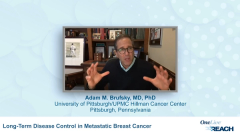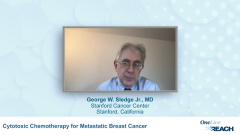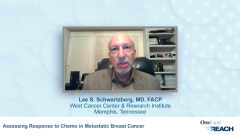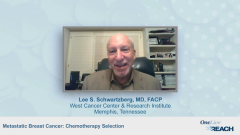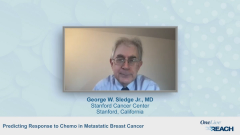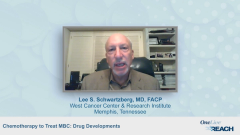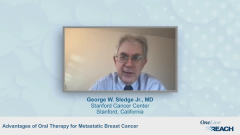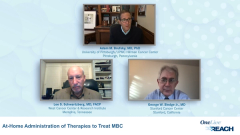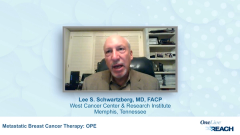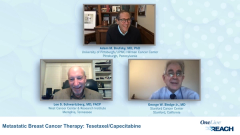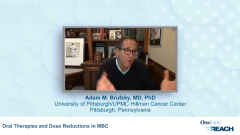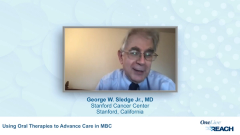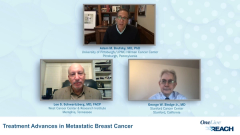
Predicting Response to Chemotherapy in Metastatic Breast Cancer
Episodes in this series

George W. Sledge Jr., MD:One of the failures in our field is that, after 2 or 3 generations of using chemotherapy for metastatic breast cancer, we are still bad at predicting which patients benefit from which drugs. If you think about it, long after HER2 [human epidermal growth factor receptor 2]–targeted therapy picked out a population and long after the estrogen receptor [ER] status picked out which patients would not benefit from an endocrine agent, if I walk into a clinic to this day, I cannot tell Mrs. Jones whether her cancer will respond to paclitaxel or capecitabine.
I do not have any clinically useful predictors for doing that. That represents a huge challenge to our field. If one thinks about it, the tragedy is not that chemotherapy causes adverse effects. The tragedy is that chemotherapy costs so much in the way of toxicity while providing so little in the way of targeted benefit. That is clearly what we need to change.
Adam M. Brufsky, MD, PhD: I know, and what has struck me is this: Lee, you are a big participant in this with Caris Life Sciences and the idea of doing ctDNA [circulating tumor DNA] sequencing or even tumor sequencing and trying to correlate mutations with response. Have you been disappointed by that, to a degree? I thought this would be a great effort. You got Caris and 200,000 or 300,000 people in sequence. You got Tempest Therapeutics, Inc. You have the big companies. You got all the academic centers doing the same thing, yet no one has come out with something that says, “You have this profile of your tumor, so you respond to paclitaxel. You have this profile, so you respond to capecitabine.” At least I have not seen it. What do you think? Why haven’t we been better at this?
Lee S. Schwartzberg, MD, FACP: We are just starting to get the data, so it is a glass-half-full type of thing. We are starting to see that it is more complex than single-gene alterations, single-driver alterations, unless where they are important like HER2. When you have a good target like imatinib BCR-ABL and with HER2, it is reasonable to say that you have a good target in breast cancer that is a driver target that remains active throughout the course of cancer.
You can do a lot of great things with that. We have new therapies that are exciting, but that is not the way. George gave a lecture that I remember well, talking about dumb cancers and smart cancers. CML [chronic myeloid leukemia] was the dumb cancer because you have only 1 alteration, and we know how to take care of that. It does not change. Breast cancer is a little smarter, and it has outsmarted us to date.
It will get there, Adam. We are starting to get AI [artificial intelligence] use, and this may be a bit of hand-waving. AI put together patterns of both gene expressions and alterations, and it put them together to try to see if we can discern who will respond to traditional chemotherapy, for example. We are at the beginning of it. We will make some progress, but I do not think it is going to be the be-all and end-all.
George W. Sledge Jr., MD:That would be an interesting question. I agree with everything you just said. When I think of biomarkers, by and large, biomarkers are negative predictors rather than positive predictors. They tell you whom not to treat, so if you are estrogen receptor negative, you do not get hormonal therapy. If you are HER2-, you do not get Herceptin [trastuzumab]. We do not have anything like that for any chemotherapy agent. You do not have to have a 100% success rate to have a positive biomarker. You just need to eliminate the patients who are not going to benefit from contention for that agent.
Lee S. Schwartzberg, MD, FACP: Remember: We had a few false alarms there. We thought ERCC might work for platinum for a while with immunized chemistry. We went down that blind alley, so you are right.
George W. Sledge Jr., MD:AL for paclitaxel.
Adam M. Brufsky, MD, PhD: AL for paclitaxel—I remember that 1. Why is that? I have always wondered why that is. Why? We clearly understand the mechanism of what some of these things do: Certain drugs are antimetabolites, and certain drugs are DNA methylating, or demethylating agents. I am curious. For how many years of work—30, 40, or 50 years—have we have not found a biomarker.
Is it because we are not sophisticated enough? We do not have the systems biology, the computing power, or the AI to do it? May it be that there just is none? I do not know. I am raising a question to you guys. You guys have been doing this for a long time, so from what I am hearing from Lee, it sounds like we are just not there. We do not have AI powerful enough. George, you are saying the same thing. Is that what I am hearing?
George W. Sledge Jr., MD:I guess, but perhaps in addition, the biology of the estrogen receptor is straightforward in a way, and the biology of HER2 is straightforward in a way. I am not sure the biology of chemotherapy response and chemotherapy resistance is straightforward. It may not have the uniformity that we see in ER or HER2. There is no particular fluorouracil receptor that we can measure. There is no platinum receptor that we can measure. Platinum’s receptor is called DNA.
Lee S. Schwartzberg, MD, FACP: That is the key: A lot of these end up working on DNA damage. There are so many evolutionary redundancies in DNA repair that cancer cells find their way around it, I think. It is going to be hard to identify that chemotherapy because whether you are an antimetabolite, you cause single-stranded breaks, or you have some other mechanism, most of the chemotherapy drugs are at least in some way working on DNA repair and replication. That is a complicated and redundant area.
Transcript Edited for Clarity


